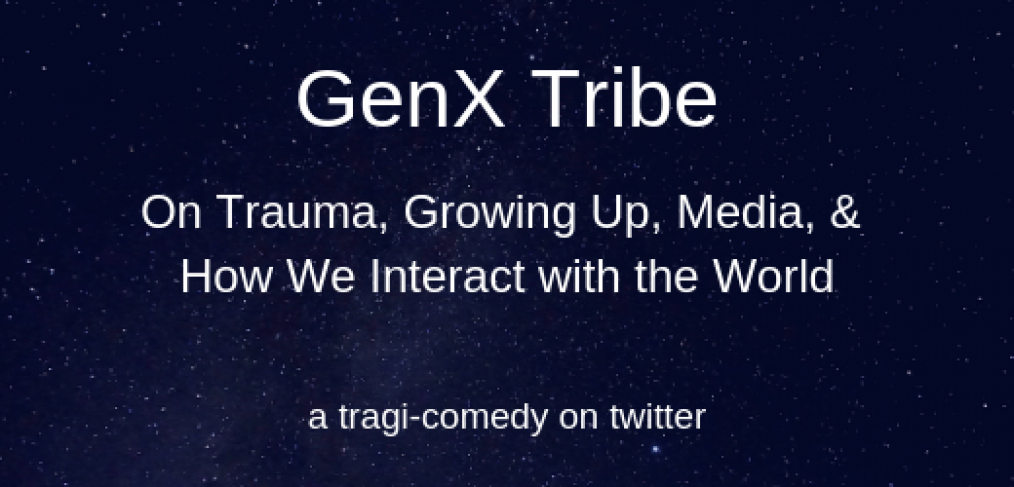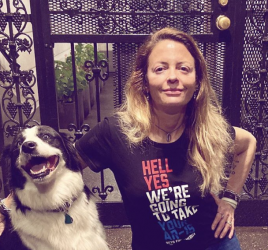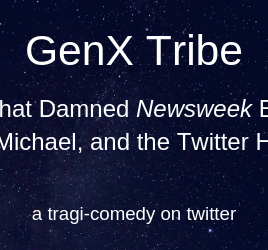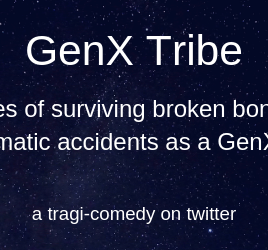
GenX Tribe: On Trauma, Growing Up, Media, & How We Interact with the World
Back in January, I posted a tweet about Generation X that turned my life a little bit bonkers for about seventy-two hours. I hadn’t intended to throw a GenX family reunion, but there I was.
In a little less than three days, more than six hundred thousand people interacted with it and—as you can see by the public numbers—more than seven thousand people responded on the more than fourteen hundred threads that were spawned from it. (I knew things had gone a little bonkers when my friend at the New York Times sent me a text early Saturday morning.)
I tell you that not as a way to promote what I did—y’all it was an accident and nobody expects the Spanish Inquisition—but to give you a little context. The GenX Family Reunion was real, and—as it turned out—raw.
I spent the better part of that holiday weekend replying to as many threads as I could, reading to ensure the trolls didn’t come out, and trying to respond in inclusive ways. As I’ve told so many people on those threads, it was the best three days I’ve ever had on the Internet.
To understand what that means, I need to tell you a little bit about me.
I’m not a ‘net novice. I’ve been on the Internet since 1984 when my parents bought me a Commodore 64 and 1200 baud modem, and my middle school math teacher taught me how to code on Saturdays at his house.
I ran up big phone bills at a twelve year old as I dialed into bulletin boards (BBS) and used telnet to dial into libraries and then tunnel out to other networks around the world. (Never doubt the tenacity of a twelve year old with loads of time on his hand and a perplexing problem to solve.)
While I never intended to live online—or write about technology—that’s exactly where my career took me. Years later, I turned my nerdy obsession into a career. I went to work for Wired, Wired.com, and MIT’s Technology Review.
I tell you that for this reason: despite growing up and living in digital spaces, what people shared caught me off-guard.
An interesting journey for sure. I never realized how much me-think is, at least in part, generational-think. https://t.co/Z4IJhzteH8
— Sarah Anne (@SarahAnneWrites) February 3, 2019
The initial bursts on the thread were, as expected, the most GenX responses you would expect. They were sardonic and self-deprecating tweets decrying what we in this generation have come to expect: nothing. And like my brothers and sisters, I giggled as I posted Christian Slater, Molly Ringwald, Winona Ryder, John Cusack, and Judd Nelson GIFs.
The reunion was in full swing, and GenX was there for the party.
But then things turned. Once the nostalgic glee subsided, people began to share other stories. Stories that, while seemingly harmless to each of us, had a dark streak to them.
I’m honestly not even sure how to characterize the stories. There’s no adequate or good way to summarize them because even in two hundred-and-eighty characters they felt full. What I can tell you is that GenX strangers began sharing about growing up and experiencing medical issues—broken bones, illnesses, and other calamities—that maybe weren’t properly attended to.
The threads moved me so much that I sat down to write about it.
GenX Tribe: Breaking Bones and Other Stories of Walking it Off
Truth be told, I had mixed feelings about writing that piece. I don’t harbor any ill feelings about the way my parents did—or didn’t—treat the calamities I faced. (Hell, I’m glad to this day that my father had a cast placed on my arm so that I could keep playing tee ball.) If you read the threads in that piece, you’ll see that most folks had the same reaction about their parents. At the time, we didn’t feel traumatized because we were kids, and kids have an amazing ability to deal with whatever reality is put in front of them.
But a funny thing happened on the way to my viral Tweet, the more stories I read the more I saw a distinct fork happen. For some, the lack of medical attention was devastating.
A side note: I was thinking—and journaling—about that thread and the ways in which each person experienced their own trauma as the polar vortex hit.
As the dangerous cold settled across large swaths of the country, my Facebook feed was filled with posts by my GenX friends who were—by and large, outraged that school would be canceled because of cold weather. And by cold I mean sub-zero temperatures that are dangerous to humans.
(And weather that kept us out of school when we were young despite the plethora of post declaring—wrongly—that we were never held out for the same reasons! We were.)
I read those posts and wondered if all the things we endured had become part of who we were? Did our sarcasm and cynicism turn into something more malevolent?
I wish I had an answer to that question. But I also know the answer to that question is way more complex than I’ll ever be able to parse.
I remember watching this. I still think about it. (THREADS was another horrifying show.) |When The Day After Terrorized 100 Million Viewers With a Vision of Nuclear War https://t.co/C3JGD4bic0
— Brad King (@thebradking) February 2, 2019
Here’s what my experience has taught me.
Since that January thread, I’ve been filling my notebook with thoughts about Post Traumatic Stress Syndrome (PTSD) and the ways in which we internalize—and normalize—trauma. Those notes have been informed by my EMDR therapy which I’ve been doing for just about three years.1
All that is to say that I have come to understand trauma in a way that I’ve never considered it before.
For the last several months, I’ve thought about how to finish this essay. Frankly, I was paralyzed thinking about that because there’s no way to end this. There’s never a way to end anything about Generation X because any conclusions are—by definition—bullshit. And yet I felt such a profound sense of pain in those threads—a pain that I haven’t been able to shake—that I kept coming back to this.
While I don’t have conclusions2, I have wondered whether our generational cynicism and relative isolation was borne out of that transition between the parents who told us to suck it up and the parents after who erred with radical empathy and helicoptering. I wonder if we haven’t grown further away from the generations before and after us because we endured the last of the latchkey parenting, because we didn’t do doctors, because we watched fictionalized The Day After and the very real Challenger disaster, and we’ve internalized all of that that trauma in ways that make it difficult to understand this new world around us.3
I wonder this because as I’ve gone back to re-read those threads, I see both a pain of dealing with horrible shit on our own and a survival mechanisms of displacement and friend-families. I also know that Generation X came of age before the advent of personal computers and came of age as the home computer revolution hit4 we straddled both of these worlds. We were raised by parents who expected you to exist on your own and we’ve seen the rise of the digital mob,5 and we’ve experienced all of that—by and large—anonymously.6
We have been, to quote Sherry Turkey, “alone, together.”
While that creates some kind of bond with our generation—gone and forgotten—that erasure also heightens the traumas and neglect of childhood. Generationally, we’ve internalized that and brushed off that isolation as the price of doing business.



